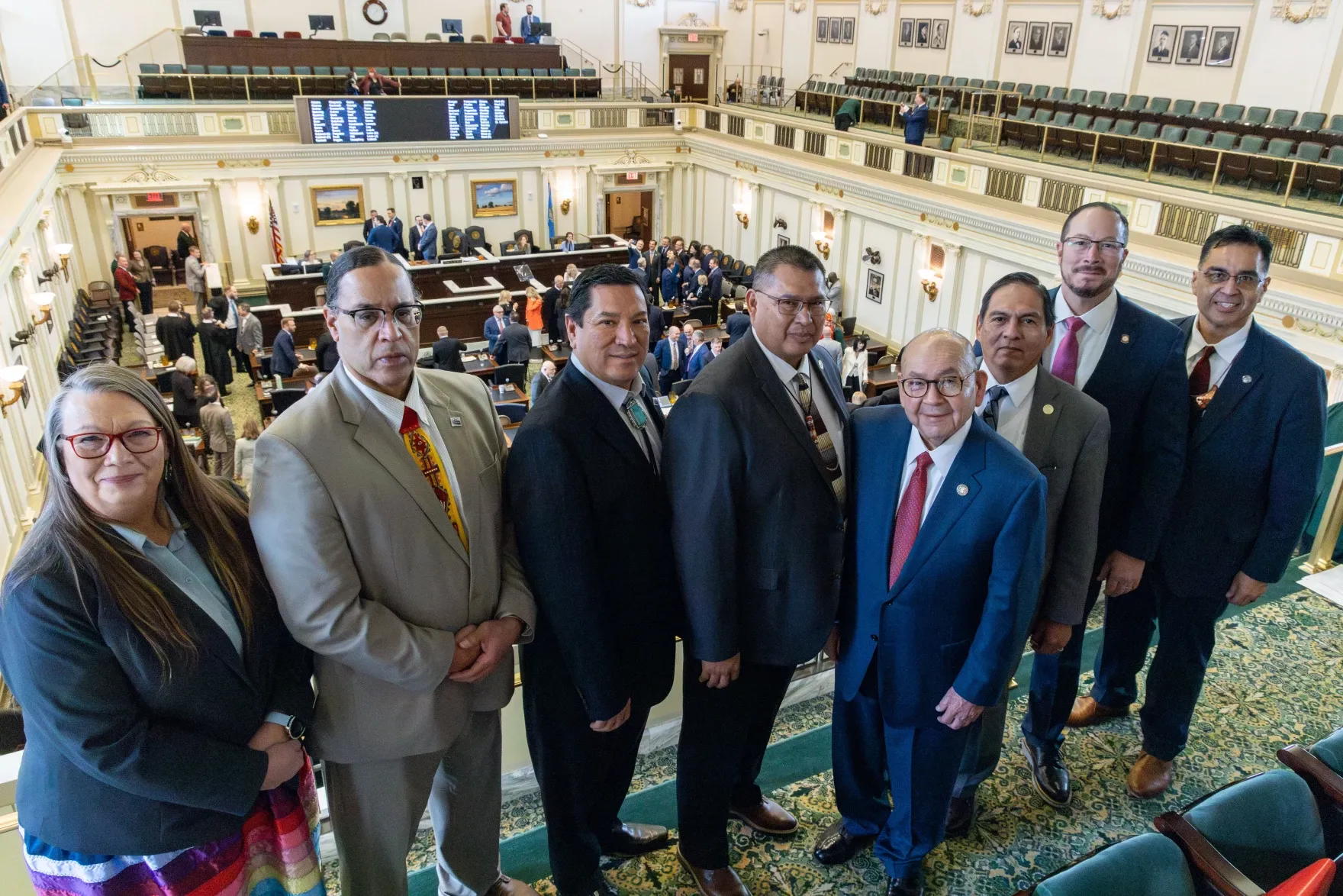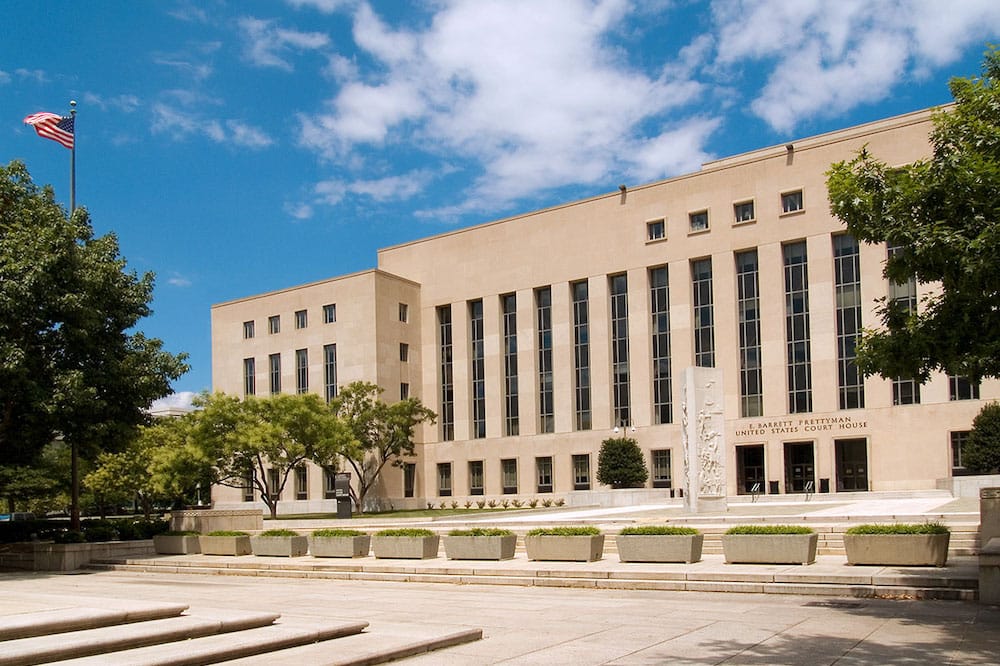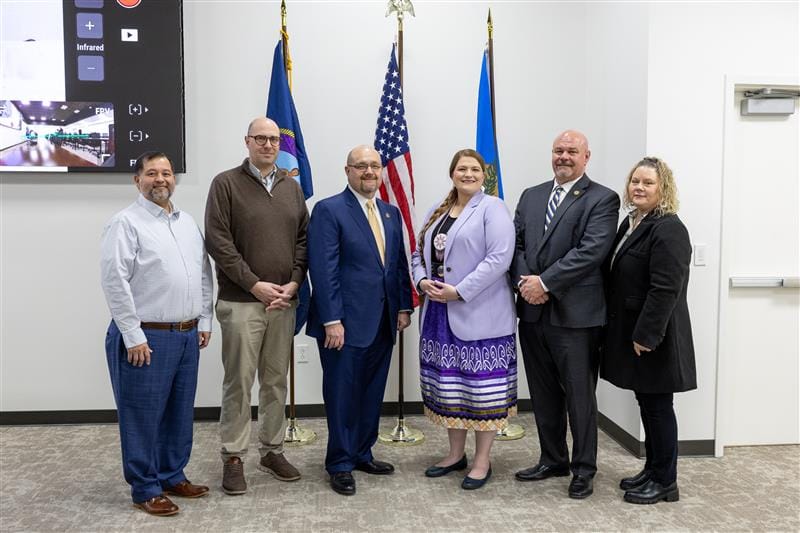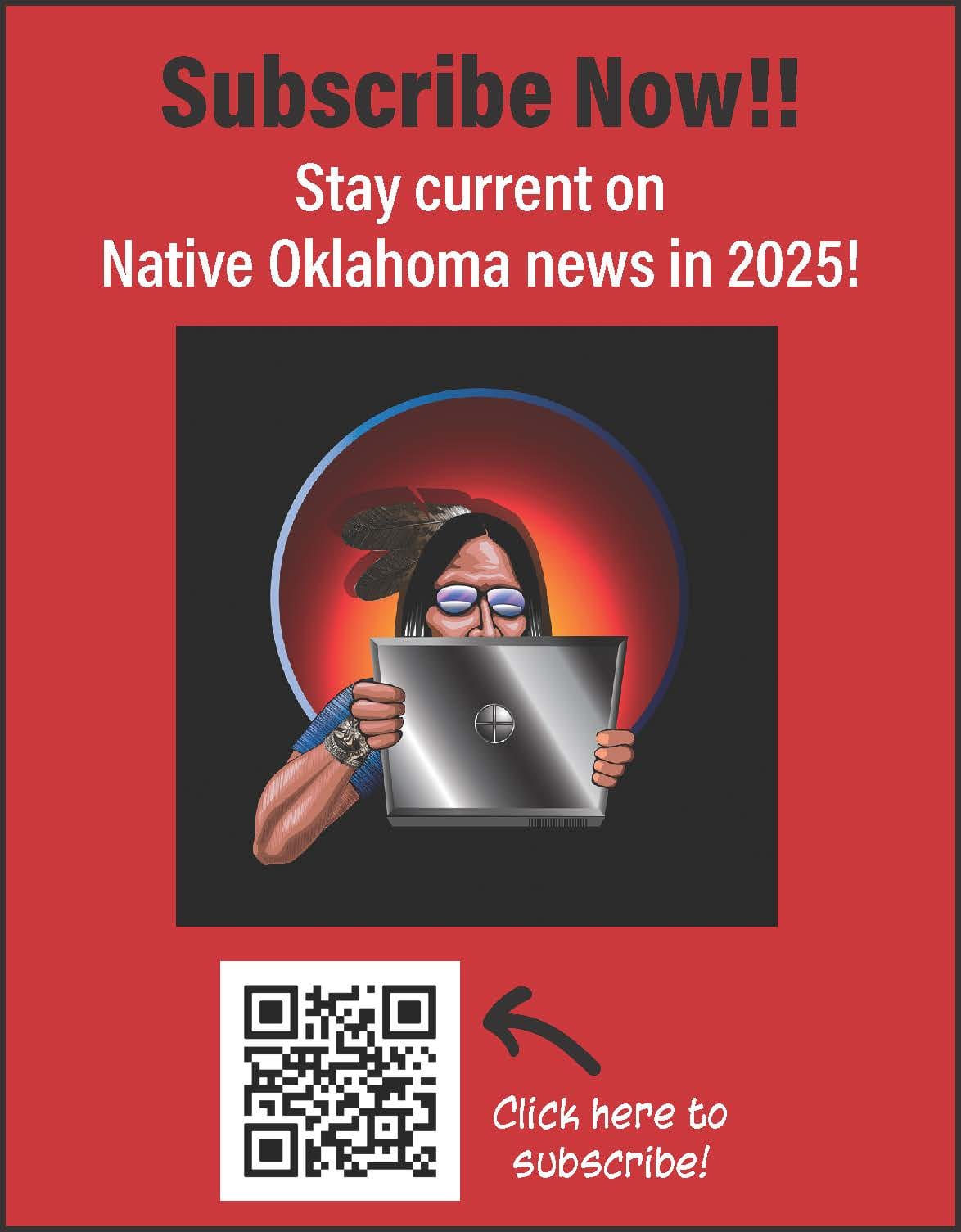

Oklahoma tribal leaders respond to Gov. Stitt's State of the State address

Gov. Kevin Stitt’s seventh State of the State address noticeably made little mention of Oklahoma’s tribal nations, unlike in years past.
By Katie Hallum (ᏧᏟ), KOSU
Instead, Stitt centered his speech on principles supporting the American Dream, including launching DOGE Oklahoma and cutting income tax.
“In order to do that, we need to commit to these four principles that Oklahomans voted for,” he said. “We need to, one, protect Oklahoma taxpayers. Two, be the best state for business. Three, safeguard our savings… and four, protect the Oklahoma way of life.”
Tribal leaders in attendance had mixed responses.
Cherokee Nation Deputy Chief Bryan Warner said he wished Stitt’s speech highlighted the tribe's collaborative efforts with the state.
“He talked about four principles and one of those was to protect the Oklahoma way. Well, without collaboration and without talking about tribal values and different things like that I think you're missing a key ingredient,” he said. “But yet I'm always hopeful. I think he hit a lot of good notes.”
Second Chief of the Muscogee Nation Del Beaver said he’ll believe these values Stitt mentioned when he sees them.
“It’s a good speech, but it's like everything else proof is in the pudding,” he said.
Chickasaw Nation Governor Bill Annoatubby had a measured response to the speech.
“He’s the leader of this state, he’s our governor, and he’s setting his agenda,” he said. “We’re going to follow that and hope it’s good for Oklahoma.”
Non-tribal leaders admonished Stitt for omitting the tribes from his policy-setting agenda.
“I found it interesting although, again, not surprising that he did not mention anything about our tribal nations. ” said Democratic House Minority Leader Cyndi Munson. “Our tribes are great partners with the state of Oklahoma. They invest billions of dollars in communities all across our state when it comes to childcare, healthcare (and) workforce. They take care of their people, they take care of the state of Oklahoma. And to not acknowledge the tribes and their leaders, who were sitting in the gallery, is a disgrace to his leadership."
In the new legislative session, tribal leaders said they hope the more than 30 new lawmakers will work with them to better the state.

Another federal court blocks Trump $3T funding freeze as tribal leaders press for protection

By Brian Edwards, Tribal Business News
A federal judge in Washington, D.C. granted a temporary restraining order Monday blocking the Office of Management and Budget from pausing federal financial assistance programs, including critical funding for tribal nations and Native-serving nonprofits Indian Country.
In a court order, U.S. District Judge Loren L. Alikhan wrote that OMB's Jan. 27 memo ordering federal agencies to freeze disbursements was likely "arbitrary and capricious" and would cause irreparable harm to grant recipients. The ruling comes after a temporary restraining order last Friday from a Rhode Island federal court protecting funding in 22 Democratic-led states and D.C., though questions remained about its application to tribal nations and organizations in other states.
In yesterday’s order, Judge Alikhan noted that granting another TRO was necessary to provide comprehensive protection for recipients potentially not covered by the earlier order.
The court actions come amid mounting concerns from tribal leaders about the potential misclassification of Native programs under recent executive orders targeting diversity and environmental initiatives. In a Feb. 2 letter to the Trump administration and congressional leaders, a coalition of tribal organizations emphasized that federal Indian programs stem from sovereign political relationships, not racial preferences.
"Federal tribal programs are not racial or preference programs, and indeed these federal funds and programs are legally mandated under the trust and treaty obligations owed to us," the organizations wrote.
The funding uncertainty for tribes extends beyond direct federal assistance. The Alliance for Indigenous Prosperity (AIP) launched last week to defend the Small Business Administration's 8(a) Program, which provides crucial contracting opportunities for tribally owned businesses. The coalition formed in response to legislative proposals in both chambers of Congress that would eliminate these contracting set-asides under the guise of "ending racism in federal contracting."
"The SBA 8(a) Program is not just a tool for federal contracting—it is a lifeline for economic sovereignty, innovation, and growth for indigenous enterprises," Kevin J. Allis, president of Thunderbird Strategic and a key AIP leader, said in a statement.
Both court orders come as agencies grapple with mixed signals from the administration. While OMB Acting Director Matthew J. Vaeth rescinded the controversial memo on January 29, White House Press Secretary Karoline Leavitt insisted the underlying executive orders targeting diversity and environmental programs "remain in full force and effect."
Judge Alikhan's ruling requires OMB to notify agencies they cannot implement the funding freeze and mandates a status report on compliance by February 7. The parties must also propose a schedule for preliminary injunction proceedings, which could determine longer-term protections for tribal and other federal funding recipients.
Comanche Cache Casino to Reopen with Major Expansion and Oklahoma's First Wahlburgers!

CACHE, Okla., – After a year of transformative renovations, Comanche Cache Casino will officially reopen its doors on Friday, Feb. 21, unveiling an expanded gaming floor and new amenities as part of its phase two development. The following week, the property will celebrate another historic milestone with the grand opening of Oklahoma’s first Wahlburgers restaurant on Thursday, Feb. 27.
“The reopening of Comanche Cache Casino represents a major step forward for our property, delivering more entertainment, dining and convenience to our guests,” said Steven Doyle, CEO of Comanche Nation Entertainment. “The addition of Wahlburgers marks a historic moment for us as we introduce this family-friendly restaurant to Oklahoma for the first time."
Comanche Cache Casino, located at 16193 OK-115 in Cache, Oklahoma, temporarily closed in February 2024 to commence its expansion. The re-grand opening will unveil a range of enhancements, including an expanded gaming floor featuring over 300 slot machines, a new open-air veranda and a convenience store and gas station, all designed to elevate the guest experience.
Wahlburgers, the popular restaurant chain founded by brothers Mark, Donnie and Paul Wahlberg, will debut at the reimagined casino with its signature menu of gourmet burgers, sandwiches, salads and desserts, including Mark’s favorite burger, the “O.F.D.” The restaurant's grand opening will include special offerings, exclusive merchandise and unique menu items to celebrate the launch.
Guests attending the casino’s re-grand opening can look forward to live entertainment, giveaways and exclusive promotions.
For more information about Comanche Cache Casino’s reopening and Wahlburgers’ launch, visit https://comanchecachecasino.com.
Repurposed emergency facility reflects Chickasaw Nation’s disaster preparedness

ADA, Okla. - Chickasaw Nation Lt. Governor Chris Anoatubby recently welcomed Federal Emergency Management Agency officials to the tribe’s emergency management facility in Ada to highlight its readiness to address a wide variety of disasters, should they arise.
Former Federal Emergency Management Agency (FEMA) National Tribal Affairs Advocate Kelbie Kennedy said she is a proud citizen of the Choctaw Nation of Oklahoma, born and raised in Buffalo Valley, Oklahoma.
“Kelbie and her staff wanted to come down and see the different aspects of our new emergency operations facility,” Lt. Governor Anoatubby said.
He said a recent renovation repurposed a portion of the building into a command post for disaster preparations.
“It has evolved over the years from a retail outlet back in the ‘80s. We’ve turned it into a hub for emergency management operations,” Lt. Governor Anoatubby said.
Chickasaw Nation Emergency Operations Facility is located at the corner of Kerr Lab and Cradduck roads in what longtime residents remember as the former site of a K-Mart department store. The tribe purchased the property and converted it into a center for COVID-19 vaccinations, not just to First Americans, but to anyone wanting to be immunized during the pandemic.
“Our first use was during the pandemic with vaccinations and then we also used it for other purposes,” Lt. Governor Anoatubby said. “It’s a large facility in which we have other functions as well. But it’s the main hub now for our emergency operations management.”
For more than two years, Kennedy served as a political appointee in the Biden administration, serving as the first to represent all tribes across the country to FEMA and the U.S. Department of Homeland Security.
Kennedy said the Chickasaw Nation was one of the first tribal nations she visited upon assuming the position in October 2022.
“I wanted to see if the Chickasaw Nation would be open for a follow-up tour of this wonderful emergency operation facility,” Kennedy said. “I wanted to have the opportunity to talk to the team here and its leadership and do what I’ve been doing for the last 2½ years, which is to get on the ground with tribal nations in Indian Country and learn and hear from them about their challenges within FEMA.”
Chickasaw Nation Emergency Management Executive Officer Steve Cash says a large room in the facility’s center serves as a training arena during what he calls “blue-sky” days, those in which no apparent disaster looms.
“We have interdepartmental training here in what we refer to as our ‘war room,’” Cash said.
“What we do is build a standardized template for continuity across the Chickasaw Nation to ensure, in an emergency situation, services are back up in a reasonable amount of time,” he said.
“We want decision-makers in the room when we have something major going on in an emergency.”
To that end, a large screen in the “war room” allows departmental leaders a live-feed view of the affected areas via drone and collaborate on the best ways to address the situation.
Recent fires in California wreaking havoc are a sober reminder of similar potential threats within the 13-county Chickasaw Nation tribal boundaries.
“Oklahoma is susceptible to fires,” Cash said. “Governor Anoatubby has given this department the authority to issue burn bans due to the possibility for fire danger in Oklahoma.”
He said volatile weather in the form of tornadoes, ice storms and flooding have also shown their potential for interruption of basic services and great harm to area residents.
Chickasaw Emergency Management was an active participant during last year’s spring tornadoes that devastated some communities in southeast Oklahoma.
Another concern is chemicals carried by trains through the area which could be subject to derailment.
Chickasaw Nation Northern Region Emergency Manager Brandon Burchfield, responsible for Jefferson, Stephens, Grady and McClain counties, pointed out some of the equipment available in responding to emergencies.
They include light towers designed to illuminate open fields in which no power source is available to assist during searches.
Cellphone boosters provide first responders with communication in remote areas in which service is spotty or nonexistent.
Large tanks known as “water buffaloes” allow fresh, safe, potable water to communities that temporarily lose their own water supply.
Side-by-side vehicles are used for search and rescue events. Cooling fans and large deployment tents, such as those employed in the aftermath of Sulphur’s April tornado last year, can be set up in 20 minutes, Burchfield said.
Burchfield said generators, a fully equipped drone truck, chain saws for debris removal, a mobile command post and more are all used when “all-hands-on-deck” emergency situations arise.
Kennedy said Chickasaw Nation Governor Bill Anoatubby has always been a supporter of FEMA’s mission, not just for First Americans, but all community members.
“Governor Anoatubby has been absolutely stellar in, and a steadfast leader for, the Chickasaw Nation. He has worked hand in hand with FEMA in so many ways to make sure everybody within the Nation’s jurisdiction is able to get help when they need it.
“Governor Anoatubby has been such a keystone leader, not only helping his own people but helping Oklahomans overall,” she said.




